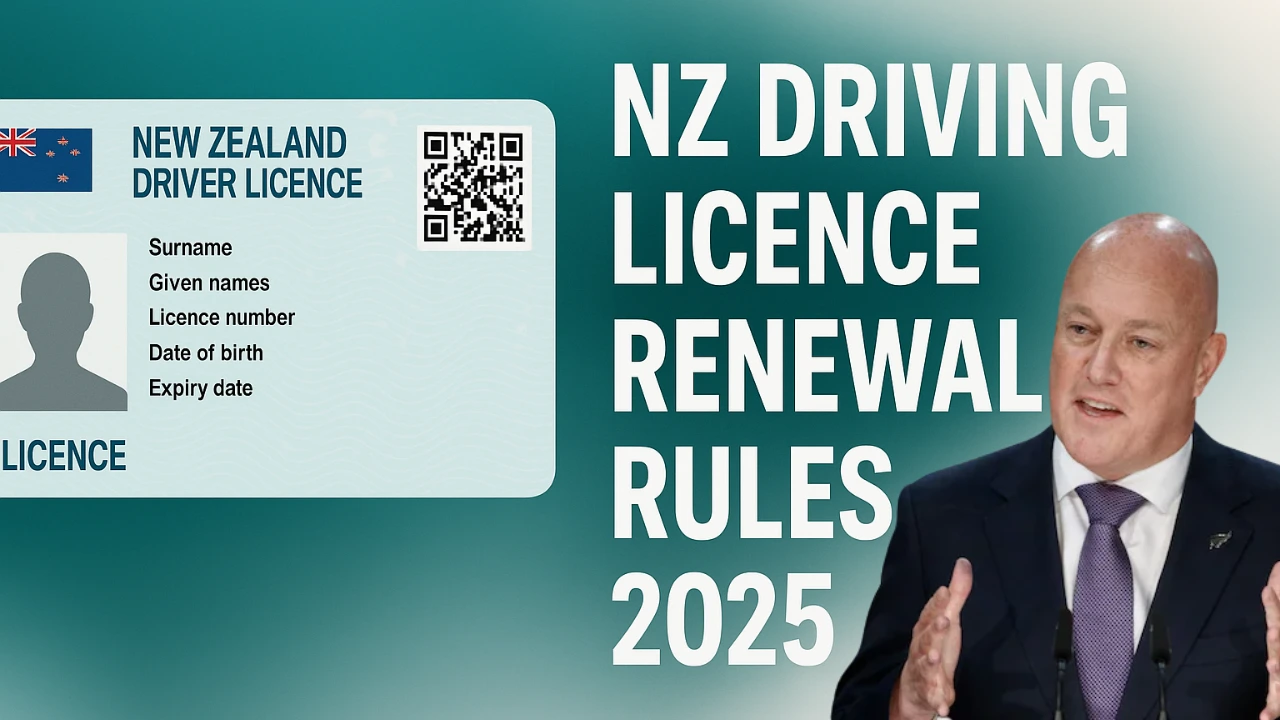In 2025, New Zealand introduces significant changes to the driving licence renewal rules, especially impacting senior drivers aged 65 and above. These changes reflect the government’s commitment to road safety while supporting senior citizens in maintaining their driving independence responsibly. The updated rules introduce more frequent medical assessments, mandatory vision screenings, conditional licences, and streamlined renewal processes designed to balance safety with convenience.
Introduction: Why the Change?
The new driving licence renewal rules for seniors in New Zealand are introduced to address growing concerns about road safety linked to age-related health changes. With an increasing number of drivers aged 65 and above, authorities have recognized the need for more regular health assessments to ensure seniors are capable of driving safely. Key concerns prompting these changes include declines in vision, cognitive function, reaction times, and other medical conditions that can affect driving ability. These measures are designed not to restrict seniors unnecessarily but to encourage proactive health monitoring and maintain safer roads for all users.
Key Updates to the Licence Renewal Rules for Seniors
For seniors aged 65 and above, the 2025 regulations introduce several noteworthy changes:
-
Medical certificates now required at every renewal.
-
Mandatory vision screening and, if needed, cognitive testing.
-
Licence renewal periods shortened with varying durations based on age and health.
-
On-road driving assessments may be mandated for some seniors.
-
Introduction of conditional licences with specific restrictions, such as daylight-only driving.
-
Digital renewal options enhanced for easier access and convenience.
These updates aim to facilitate safer driving among seniors through closer monitoring while simplifying administrative processes where possible.
New Medical and Vision Assessment Requirements
Medical fitness to drive is now a mandatory part of the licence renewal process for all drivers over 65. This includes:
-
A health check from a general practitioner covering cardiovascular health, neurological status, hearing, and overall fitness.
-
Mandatory vision tests during renewal to verify that visual acuity and field of vision meet driving standards. Seniors with identified issues may be referred to specialists for further testing.
-
Cognitive assessments where indicated, particularly if there is concern about memory, reaction time, or decision-making ability.
These health checks ensure that renewal decisions are based on current and comprehensive medical data, helping identify drivers who may need additional evaluation or restrictions.
Impact on Licence Renewal Frequency and Duration
The licence validity periods for seniors are now shorter, reflecting increased renewal frequencies to regularly reassess fitness to drive. The typical renewal periods under the new rules are:
| Age Group | Renewal Frequency | Renewal Validity |
|---|---|---|
| 65 to 74 years | Every 5 years | 5-year licence validity |
| 75 to 79 years | Every 2 years | 2-year licence validity |
| 80 years and up | Every 1 year | 1-year licence validity |
This graduated system allows more frequent monitoring with increasing age, recognizing that medical conditions affecting driving capability become more likely over time.
Conditional and Restricted Licences Explained
For seniors whose medical assessments indicate some limitations, conditional licences may be issued. These licences include restrictions tailored to ensure safety while allowing continued driving privileges. Typical restrictions include:
-
Driving only during daylight hours.
-
Driving within a set distance of home (e.g., within 10 kilometers).
-
Prohibitions on driving in heavy traffic or high-speed zones.
-
Requiring corrective lenses while driving.
These conditions aim to preserve seniors’ mobility and independence while mitigating risks associated with specific vulnerabilities.
Digital and Online Renewal Options for Seniors
To improve convenience, New Zealand Transport Agency (NZTA) has expanded digital renewal options for seniors. If seniors’ medical certificates and vision tests are electronically certified and verified, they can apply for licence renewal online via the NZTA portal. This reduces physical visits and accelerates processing times, especially benefiting those with mobility or transport challenges.
Support and Alternatives for Seniors Who Cannot Renew
For seniors who are deemed unfit to drive after assessments, assistance and alternatives are provided to help maintain mobility, including:
-
Access to subsidized or free public transportation options.
-
Community transport services tailored for seniors.
-
Referrals to mobility support programs and counseling services to adapt to driving cessation.
These measures acknowledge the importance of maintaining independence and quality of life for seniors unable to continue driving safely.
Comparison Table: Previous vs New Renewal Rules for Seniors
| Policy Aspect | Previous Rule | New Rule (2025) |
|---|---|---|
| Starting Age for Checks | 75 years | 65 years |
| Medical Certificate | Required from 75 years | Required every renewal from 65 years |
| Vision Testing | Optional, case-by-case | Mandatory for all 65+ |
| Renewal Frequency | Every 10 years until 75, 5 years after | Graduated: 5, 2, or 1 year based on age |
| On-Road Tests | Rarely required | May be required based on medical results |
| Conditional Licences | Possible but limited | Expanded with detailed restrictions |
| Online Renewals | Limited | Expanded for those with certified health data |
What Seniors Need to Know and Prepare
Seniors approaching licence renewal should:
-
Schedule medical and vision appointments well in advance.
-
Obtain the required medical fitness certificates from approved practitioners.
-
Be prepared for possible requests for further tests or driving assessments.
-
Explore online renewal options through NZTA for a smoother process.
-
Understand conditional licence possibilities and their terms if applicable.
-
Plan alternative transport options if unable to renew their licence.
Early preparation can ease the renewal experience and help maintain driving privileges.
Conclusion: Balancing Safety and Independence
New Zealand’s 2025 driving licence renewal rules for seniors reflect a sensitive balance between ensuring road safety and respecting the independence of older drivers. Through more frequent health assessments, vision testing, and flexible renewal conditions, the system aims to support seniors in driving safely for as long as possible. At the same time, provisions for restricted licences and alternative transport options address the needs of those facing health challenges. These changes mark a progressive move towards a smarter, safer, and more senior-friendly licensing system in New Zealand.








Leave a Comment